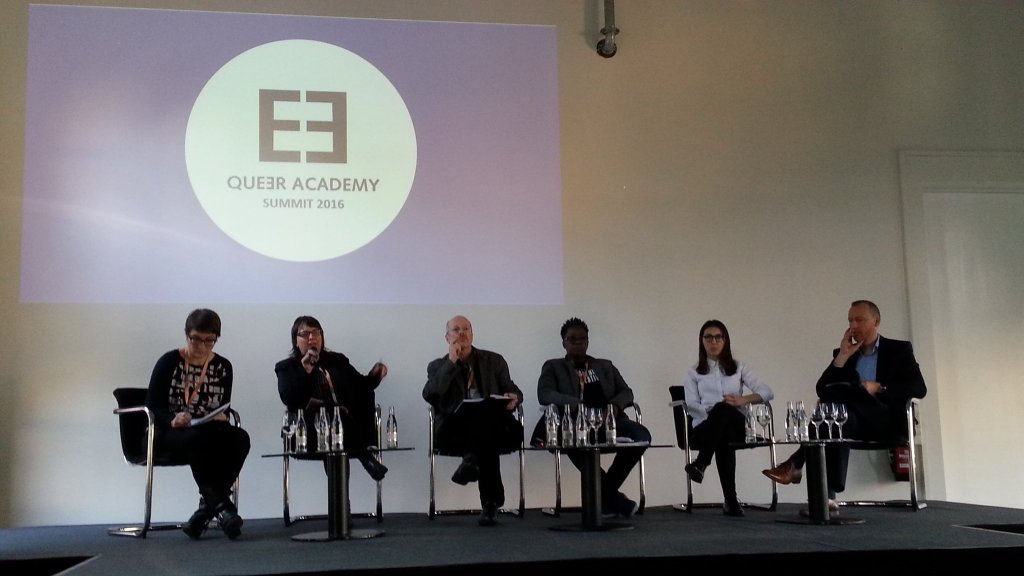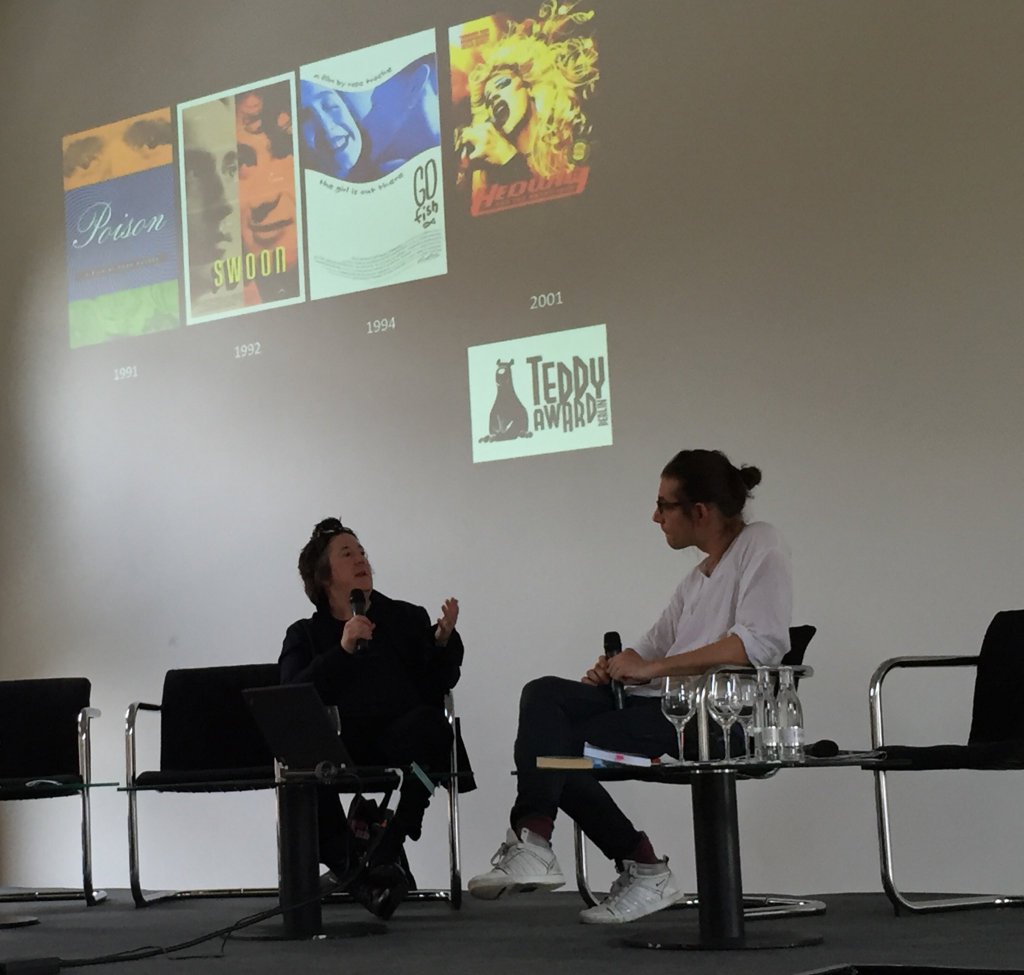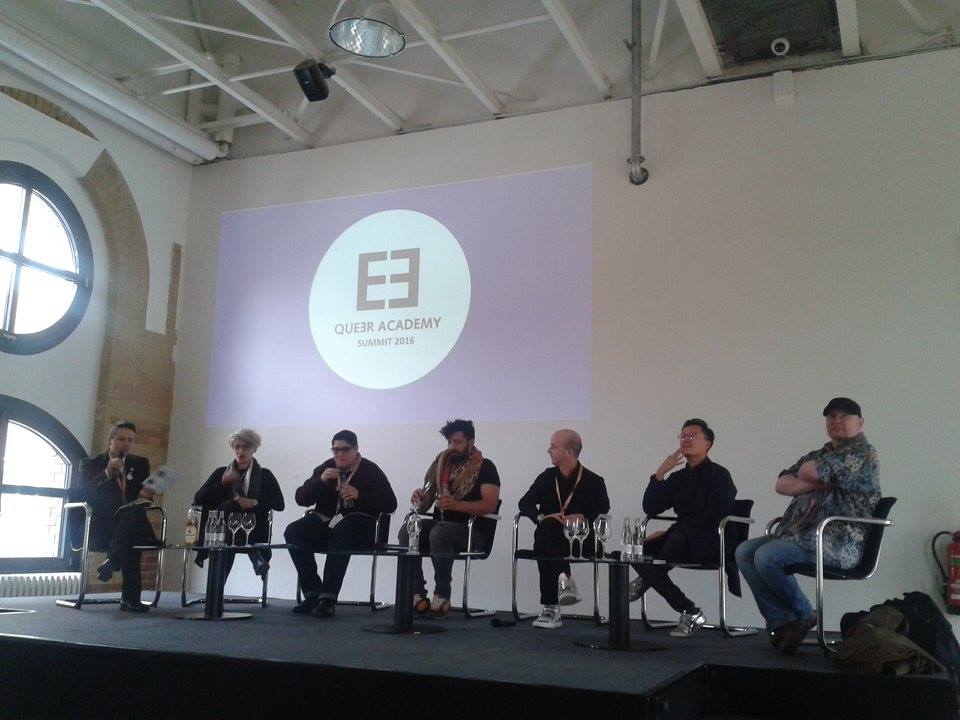On the occasion of the 30th anniversary of the TEDDY award, the LGBT/Q film award at the Berlin International Film Festival (Berlinale) the Queer Academy put on a Film Summit to discuss queer archiving and queer film festivals in practice on February 17, 2016 at the Station Berlin, Luckenwalder Str. 4-6, 10963 Berlin. As a continuation of the discussion that was started at the Queer Film Culture: Queer Cinema and Film Festivals conference in Hamburg in October 2014, the organizers invited me to moderate the panel on queer film festivals in practice. (See the program below or view the booklet online.)
The Queer Academy is an annual convention of international filmmakers and
festival organizers in the gay-lesbian-transgender context (2015 figures: 180
persons/institutions) at the Berlinale. The Queer Academy aims to establish
itself as an institute of queer cultural memory. The Academy will become an
archive of queer culture and history that binds together queer cultural productions
and cooperates with other organizations. Since memories are essential for
the identity construction, the Queer Academy will offer an opportunity for queer
people to form and find their identity in queer memory.
Summit Program
10.00am Opening Wieland Speck, Berlin, Curator of the Panorama at the Berlinale
10.15am Keynote: Bob Hawk, Film and Festival Advisor
10.30am Keynote Jan-Christopher Horak, Los Angeles, Director of the UCLA Film & Television Archive
10.45am Panel 1: Re-imagining the Queer Archive
PANEL 1: Re-imagining the Queer Archive
While researching for the TEDDY 30 retrospective, it only became too clear: Feature films, video art and amateur movies around the world are about to vanish and need to be restored, digitized and distributed. Archives are facing a challenge in order to prevent the analogue film stock from decay. Furthermore, it will be a crucial task to re-invent models of distribution to make our queer film heritage part of our cultural memory.
 Queer Academy Summit, Panel 1: Nanna Heidenreich, Dagmar Brunow, Martin Körber, Chery Dunye, Alice Royer, Andreas Kraß (c) Skadi Loist
Queer Academy Summit, Panel 1: Nanna Heidenreich, Dagmar Brunow, Martin Körber, Chery Dunye, Alice Royer, Andreas Kraß (c) Skadi Loist
Participants:
- Dr. Nanna Heidenreich, host, Institute for Media Studies, Braunschweig University of Art; Arsenal-Berlin, Forum Expanded, Berlin
- Alice Royer, Legacy Project Manager, Outfest Los Angeles; American Archive for Television and Film, University of California, Los Angeles
- Prof. Martin Koerber, Head of the Archive at the “Deutsche Kinemathek – Museum für Film und Fernsehen”, Berlin
- Prof. Dr. Andreas Kraß, Department of German Literature, Humboldt University; Director of the Archive of Sexology, Humboldt University, Berlin
- Dr. Dagmar Brunow, Institute for Film Studies, Linnaeus University, Vaxjö, Sweden
- Cheryl Dunye, Filmmaker, Department of Cinema, San Francisco State University, Liberia/San Francisco
For more background on the panelists and their take on programming see the Teddy Award blog.
 Christine Vachon & Toby Ashraf (c) Alice Royer
Christine Vachon & Toby Ashraf (c) Alice Royer
1.30pm In Conversation with Christine Vachon moderated by Toby Ashraf
Christine Vachon is an “Independent Spirit Award” and “Gotham Award” winner who co-founded indie powerhouse “Killer Films” with partner Pamela Koffler in 1995. Over the past decade and a half, the two have produced some of the most celebrated American indie features including Far From Heaven (nominated for four Academy Awards), Still Alice (Academy Award winner), Boys Don’t Cry (Academy Award winner), One Hour Photo, Kids, Hedwig and the Angry Inch, Happiness, Velvet Goldmine, Safe, I Shot Andy Warhol, Camp, Swoon and I’m Not There (Academy Award nominated). In television, Vachon recently executive-produced the “Emmy” and “Golden Globe” winning miniseries Mildred Pierce for HBO and an upcoming series on Amazon based on the life of Zelda Fitzgerald. Other recent work includes: Kill Your Darlings, Magic Magic, Carol directed by Todd Haynes and Wiener-Dog written and directed by Todd Solondz.
2.15pm Panel 2: Queer Film Festivals in Practice – Programming and Curating Strategies
PANEL 2: Queer Film Festivals in Practice
Almost four decades ago, the first Gay Film Festival opened back in the day in San Francisco. Since then much has happened and those now called Queer or LGBTQI* Film Festivals have flourished and expanded in all cultural backgrounds all over the world, most recently new festivals have been founded in Africa and also the Middle East. The growing number of festivals also fostered different and more diverse programs within the Queer Film Festival Circuit. From classical queer/LGBTQI*content to pornography and from the avant-garde to activism; six programmers from different cultural backgrounds will talk about their view on curating and activism on this panel.
 Queer Academy Summit, Panel 2: Skadi Loist, Alexandra Carastoian, Des Buford, Sadaat Munir, Joao Ferreira, Xiaogang Wei, Jürgen Brüning (c) Dagmar Brunow
Queer Academy Summit, Panel 2: Skadi Loist, Alexandra Carastoian, Des Buford, Sadaat Munir, Joao Ferreira, Xiaogang Wei, Jürgen Brüning (c) Dagmar Brunow
Participants:
- Dr. Skadi Loist, host, Department of Media Studies, University of Rostock; Lesbisch Schwule Filmtage Hamburg | International Queer Film Festival
- Alexandra Carastoian, FAQiff – Feminist and Queer International Film Festival, Bucharest
- Desiree Buford, Frameline – San Francisco International LGBTQ Film Festival
- João Ferreira, Queer Lisboa – International Queer Film Festival
- Saadat Munir, AKS Film – Art – Dialogue Festival, Pakistan and Denmark
- Xiaogang Wei, Beijing Queer Film Festival
- Nosheen Khwaja, GLITCH QTIPoC Film Festival Glasgow
- Jürgen Brüning, Porn Film Festival, Berlin
For more background on the panelists and their take on programming see the Teddy Award blog.
3.45pm Break
4.00pm Programmers/Queer Academy Meeting + the Queer Connection
Following the Panel discussions, the annual Programmers/Queer Academy Meeting will take place. This is the place where new festivals are presented, new cooperations established, as well as, organisational and content practices are discussed. Filmmakers and distributors are invited to discuss their works directly with festival makers in the framework of the Queer Connection and therefore to already set the first festival screenings during this event. In addition to filmmakers and distributors, who present the films included in the current Berlinale programme, local Berlin filmmakers and producers are welcome to personally show their projects.
